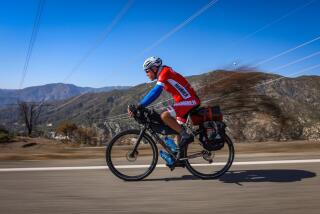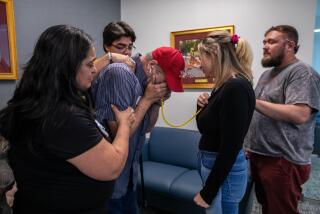Team Effort : Transplants Saved Racers Who Use Sport to Urge Organ Donations
- Share via
BIG BEAR — Mike Redding zoomed down the mountainside on his bike as if he had just been given new life. Literally.
Redding, a Huntington Beach resident, was competing in a mountain bike race with his team: three others who, like Redding, have had heart or kidney transplants.
“Some people might sit on a couch after a transplant, but I’ve been given a second chance at life and I’m going out there to do what I’ve always wanted,” said Redding, 32, who received a kidney from his mother two years ago.
The four friends decided to form Tx Racing Team last June not only for love of the sport but to increase public awareness of organ donations and to sign up new donors.
In addition to competing in mountain bike races across the country, the group plans to set up donor information booths at the events, which started with the races in Big Bear this past weekend.
“We’re here to help people out, especially the kids,” Redding said.
He knows that without help, he would have died.
When Redding’s wife bought him his first mountain bike in 1991, he began training on it. But he saw little improvement, and sometimes his performance declined.
Several people told him that if he kept riding, he would improve. But a routine blood test discovered the problem: His kidneys had almost completely shut down.
“I was a week away from dying,” Redding said. “My blood was so toxic that just standing up or walking could have killed me.”
He was put on dialysis and told to expect a five-year wait for a kidney donor. But his mother proved to be a match.
“I’m lucky my mom stepped up to the plate,” he said. “She gave me a second chance.”
*
However, thousands of patients across the United States are not so lucky.
Statistics from the Regional Organ Procurement Assn. show that as of April, 51,859 Americans were waiting for donor hearts, kidneys, livers, bone marrow or other organs. Every 18 minutes, a new person is added to the waiting list, and each day eight to 10 people die waiting.
Troy Rauh of Huntington Beach knows those statistics well.
After three years of riding mountain bikes and competing in events, Rauh woke up one day in 1990 with breathing trouble. Doctors diagnosed cardiomyopathy, an obscure disease that tripled the size of his heart.
He spent almost five months in a hospital waiting for a donor, all the while longing to be outside riding. His spirits were only buoyed by pictures that a friend had taken while traveling throughout the United States.
“I was afraid I was never going to get out of the hospital,” said Rauh, 36. “Those photos, that’s what kept me going.”
Three months after his heart transplant, Rauh said, he was biking 100 miles a week trying to get back into condition.
*
In 1994, Rauh and friend Shannon Woods, another transplant recipient, decided to compete together in mountain bike events not only for love of the sport but to show others like themselves that it is possible to live a normal and healthy life.
In Woods’ case, a freak accident might have saved his life.
While riding his bike in 1989, Woods, also of Huntington Beach, was hit by a car. At the hospital, doctors discovered that his kidneys were slowly deteriorating due to a strep throat infection.
He was put on dialysis, but his kidneys failed about six months later, and his only hope for long-term survival was a transplant. Like Redding, Woods received a kidney from his mother.
He began riding soon after he got out of the hospital, but his body began to reject the kidney so he “took it easy for a while.” It took Woods, 27, almost a year before he was healthy enough to ride competitively again.
Rauh and Woods toured the country competing in events and soon became known as “Team Transplant” on the circuit. The pair joked about starting a team, but it never really took form until last year.
Redding, who had worked with Rauh before the operation, was recruited, and after the trio met kidney recipient Doug Butcher, 30, of Scottsdale, Ariz., through mutual friends, the team was complete.
“We’re not just here to sign donors up, but to educate the public,” Rauh said. “We want them to know that donating an organ is really a good thing, and I’m living proof.”
“Just looking at the stats,” Woods said. “There are thousands of sick people who are waiting for organs, so we hope what we’re doing can get some results.”
*
In addition to manning the booths, the four are working with the Barbara Anne DeBoer Foundation to create fund-raising and other service programs for those who need organ transplants.
“They are a super bunch of people,” said Jim Wilson, a volunteer at the foundation. “They are literally spending their own money to go out there and raise awareness.”
Wilson said that it takes more than signing a donor card that comes with a your driver’s license to become a donor. Because the final decision rests with your next of kin, “You have to talk to your family members about it,” he said. “In the end, they have the final say.”
More to Read
Sign up for Essential California
The most important California stories and recommendations in your inbox every morning.
You may occasionally receive promotional content from the Los Angeles Times.










